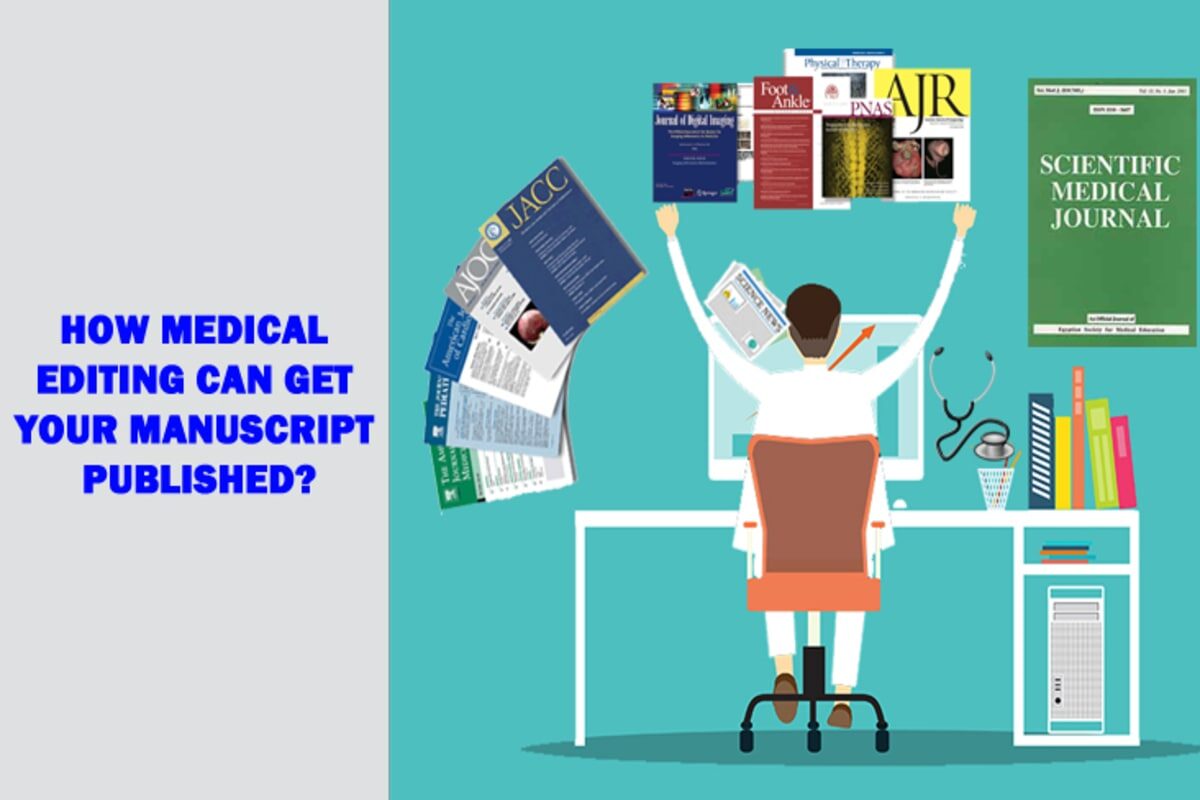Getting your manuscript published in a high-impact journal is a crucial part of gaining recognition for your medical research. So, it’s highly essential to acquaint yourself with the steps to be followed in getting your manuscript published.
Doing a thorough research on your medical topic and medical manuscript writing in strict accordance with the principles of scientific or medical publication are the preliminary steps you must pay heed to. However, it’s generally seen that 30-50% of the medical paper get rejected even before they are passed on for external peer review.
And one of the reasons for rejection is the use of poor language in the manuscript. Some authors do not take the initiative of proofreading their medical manuscript before submission, while others get it proofread by their colleagues.
If you think that writing a detailed medical article of your research and submitting it to the journal is the end of your responsibility, you are highly mistaken. It’s not the publisher’s responsibility to correct any grammatical or language errors in your paper. It is the author’s domain i.e. your primary responsibility to make sure that your research paper is in its best form before it is submitted for publication.
This is also important from the view of your reputation; reputation as a research scientist. Why give an opportunity to the publishers to pinpoint on your language and writing skills? Why not let them focus on the quality of your research?
So, proofreading and editing your medical manuscript is of paramount importance if you want to get it published in a high-impact medical journal.
Now, the question arises, what are the options for your medical manuscript editing?
Manuscript editing options
You can proofread and edit your manuscript yourself or get it done by your colleague. This will, of course, save you money, but before proceeding ensure that you or your colleague possesses the necessary skills for doing the job.
Many are of the opinion that proofreading and editing a medical manuscript is easy and requires just a perfect grasp of the English language, which, however, all do not have. Many of your colleagues do not have the necessary language as well as the scientific expertise to fully grasp a research paper. This may end in a level of editing that doesn’t match the requirements of the publication journal. It will only waste your time and ultimately nothing will come in hand.
Taking help from a professional medical editor can save you from such pitfalls. Before proceeding to hire one, you must understand what is medical editing and the role of a medical editor in getting your manuscript published.
What is medical editing?
Editing of a medical manuscript is way beyond eliminating the grammar, vocabulary, and punctuation errors in the document. It is the procedure of revising your manuscript to make each piece of information contained in it clear and precise. The language you use, the sentence construction, flow, and the clarity of the presented information are checked and revised during medical editing. After all, your manuscript is for the readers; to inform and instruct them about the new advances in the medical field. And it will be useless to publish a manuscript that doesn’t serve this purpose, that doesn’t engage your readers in reading your research paper. So, editing of a medical manuscript is crucial before it is submitted for publication.
Role of a medical editor in getting your manuscript published
As said before, editing of your medical manuscript is compulsory before submitting it for publication. And a professional medical editor is the person who carries out this responsibility in a flawless manner.
He/She is the one who is a language expert with precise knowledge of the scientific language and will make your manuscript ready for submission to the publisher. He/She will remove all the language errors, jargon, and awkward phrases used in the manuscript to make it readable and interesting for your audience.
Furthermore, they will ensure that all the facts, data, and figures enlisted in the manuscript are consistent with the guidelines of a scientific publication. He/She might inquire with you about the issues regarding logic and organisation of information or any missing piece of information in the manuscript.
So, don’t argue with your medical editor even if you hold a different opinion than him. He/She is not your critic, rather a support who helps you to present your manuscript in its best form. You might fear to lose your voice of opinion or style of writing in the hands of a medical editor.
However, that’s not the case. A competent medical editor views your manuscript from the reader’s point of view but also upholds your voice of opinion. In fact, he strives to make it better by rectifying all the loopholes which you might have missed.
Therefore, acknowledge the comments and queries placed by your medical editor for resolving the lapses in your manuscript.
Moreover, even if you are an expert in your field of medicine, writing a medical manuscript doesn’t come easily to you. You need to be a language expert too. And a medical editor is two-in-one. He/She possesses the knowledge of the scientific domain as well as the proficiency of the language used in the medical manuscripts.
So, hiring a professional medical editor is not a loss. It will indeed raise the chances of your manuscript being accepted for publication.
But, you must look for the following qualities in a medical editor before handing over your manuscript for editing:
- They should possess a general scientific knowledge of the fields covered in the publication and be skilled in the art of writing, editing, and critical assessment.
- They should be familiar with the general principles of statistics.
- They should be able to make rational changes in the manuscript and notify you according to the set deadlines.
- They must be impartial and honest in his editorial decisions.
- They must be able to maintain confidentiality about your submitted manuscript.
Maintaining a positive relationship with your medical editor will go a long way in increasing the success rate of your manuscript publication.
Don’t Stop Here ! Contact our medical editing services experts to get your manuscript published.




